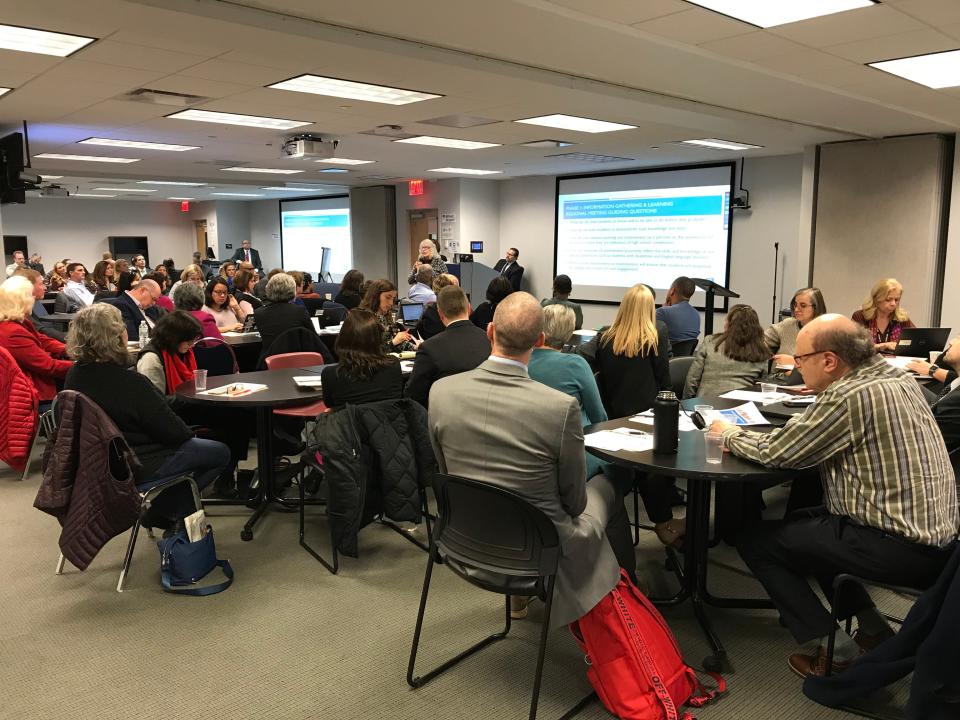Don't say goodbye to Regents exams; NY is years from creating alternative assessments
After a heralded state commission recommended major changes to New York's high school graduation requirements in November, two things became clear.
First, there is widespread agreement that New York's entrenched Regents exams need to be replaced or supplemented as the primary means to determine whether students are ready to graduate. New York is one of only nine states that still require such high school "exit exams."
Second, the state has not yet set a path toward creating alternative ways to assess students nor a timetable for doing so. And the process, which is sure to be difficult, is likely to take years.
"What's concerning to me is that, you know, that commitment to this kind of project has to be maintained for years and years," said Christine Clayton, an education professor at Pace University.

Even the state Education Department official who is leading the efforts, Angelique Johnson-Dingle, deputy state commissioner of P-12 instructional support, acknowledged that there is a long road ahead before the state figures out the future role of Regents exams and could introduce alternative forms of assessment.
It's a process that could outlast New York's top educational leaders, who are wholly behind the initiative — State Education Commissioner Betty Rosa is 72 and Board of Regents Chancellor Lester Young is 76.
"Of course, then you know, a new administration comes in, we're all concerned over fiscal developments over the next several years," said Rob Feirsen, an associate professor at Manhattanville College. When money gets tight, he asked, will the effort continue?
'It's a lot of work. But we're going to do it'
The state Board of Regents, which sets statewide education policy, began an extensive review in 2019 of what it should take to graduate from high school in New York and how best schools could measure what students know and can do.
The Regents began holding meetings around the state — before the pandemic slowed things up — to find out what educators, parents and others wanted to see. A common theme was that New York's Regents exams are outdated.
"One size doesn't fit all. Right now, that's what we have," Gary Armida, an English teacher at North Rockland High School, said at a 2020 forum in Harrison.

The Board of Regents appointed a Blue Ribbon Commission in September 2022 to review public comments and available research. In November, the commission endorsed the idea of developing new ways to measure what students know, beyond standardized testing, but did not outline how such intensive work would be done.
The commission issued other broad recommendations, like greater availability of career and technical education to students.
Johnson-Dingle and other state Education Department staff are now working through the commission's recommendations to determine what it would take to make them happen — there may need to be changes to laws or regulations — and how such changes could impact school operations and testing schedules.
The Education Department intends to present a detailed summary of the work to be done in late spring or early summer. Beyond that, there is no timeline for when alternative assessments might be created, let alone available for use.
"Because it is so massive, we need the time to truly understand and then be able to communicate to the Board of Regents what this actually means for us to implement this work," Johnson-Dingle said.
Some recommendations could be implemented fairly quickly, while others could take years, she said.
Johnson-Dingle said the state would have to develop extensive guidelines for any changes, as well as training for teachers and other educators.
"It is expensive. It is huge. It's a lot of work. But we're going to do it," Johnson-Dingle said.
Regent Frances Wills, who represents Westchester, Rockland, Putnam, Dutchess and Orange counties on the board, called the recommendations "idealistic." She acknowledged that turnover on the Board of Regents and among the Education Department's leadership could happen before all recommendations are realized.
But she said New York is heading in the right direction, even if it will take time to implement changes.
She suggested thinking about the process "as what we're learning about best ways to ensure that our students are successful. While we're learning that, we're implementing some of these changes in our schools when we can."
What are the options for alternatives to Regents?
The key question facing the state is what will become of the Regents exams, which date back to the 1800s, and what other forms of assessment will be introduced.
New York is only one of nine states that still require tests for graduation, according to the National Center for Fair & Open Testing, or FairTest, a national organization that advocates for equitable forms of testing.
At least 21 states offer multiple pathways to graduation, or different diploma options, according to the Education Commission of the United States.

Wills and other educators said they don't believe the Regents exams will be going away, but that students will be given other opportunities to show they are qualified to graduate.
Some states allow students to produce a major project, use a portfolio of their work or do a performance-based assessment, said Harry Feder, executive director of FairTest.
Other states simply allow students to graduate if they have a required number of class credits. Some states require students to take the SAT or ACT instead of exit exams like the Regents.
New York could also decide to let school districts develop their own alternative assessments, Feder said.
Creating new pathways to graduation and fully implementing them is a three- to five-year transition, he said.
Marc Baiocco, Clarkstown schools superintendent and president-elect of the Lower Hudson Council of School Superintendents, said he could see districts coming up with their own performance-based assessments to supplement Regents exams. Districts could create their own grading systems and submit grades to the state, he said.
The Blue Ribbon Commission also recommended reorganizing New York's credit requirements, which would give students more say over what classes they take. But doing so would require giving students more assistance, Pace's Clayton said.
Such a personalized system can't function with an outdated support system, she said, noting some schools have one counselor per hundreds of kids.
"There's no recognition that if we create a more individualized set of pathways and choices for students we need to provide them with some advising and counseling that is really meaningful," she said.
Lessons from NY schools already using alternative assessments
No one knows what testing alternatives might ultimately look like in New York, but a group of 38 schools already exempt from most Regents exams could offer some inspiration.
The schools — 36 in New York City, one in Ithaca and one in Rochester — make up the New York Performance Standards Consortium, which has focused on performance-based assessments rather than standardized tests for over two decades ago.

These schools are structured around inquiry-based learning. In the classroom, that means less of teachers lecturing and more student discussions and delving deeply into certain topics, said Alexandra Rathmann-Noonan, the consortium's director of school support.
"That's not to say that teachers in Regents schools don't try to do that," she said. "It's just that the pace that's expected of sort of coverage of content makes it really, really hard."
Students at the 38 schools take performance-based assessments, which vary by subject. All include a written component and an oral defense.
In social studies, that could mean writing a research paper, followed by the oral defense. Students can do experiments in science and engineering designs in math, Rathmann-Noonan said. The only Regents exam Consortium students must take is in English.
Educators often point to the Consortium's work as an example of where New York should go.
But the Consortium itself doesn't think its model is the answer for all schools, Rathmann-Noonan said.
"It is actually not our belief that the best thing for every child in New York state is for every school to do exactly what the Consortium is doing," she said.
Communities have different needs, she said, but every community should have the option to do performance-based assessments.
While the recommendations make it sound like the Regents could co-exist with other forms of assessment, Rathmann-Noonan said the Consortium also doesn't believe it wise for schools to allow students to choose between taking Regents exams or alternative paths to graduation. The Blue Ribbon Commission's recommendations made it sound like several forms of assessment can co-exist at a given school, she said, but it's better for a school to commit to one approach.
"Running two parallel systems is going to mean that neither system is going to function to its greatest potential," Rathmann-Noonan said.
The Consortium has spent 26 years developing its model and making changes to the grading systems its teachers use.
The nuts and bolts of creating new assessments
Johnson-Dingle said the state Education Department will lead the work of creating new assessments and implementing the Blue Ribbon Commission's recommendation, or at least gathering other educators and experts to achieve them.
When the state started looking at high school graduation requirements, it contracted with an outside agency in 2020 to review research and tabulate feedback. At the time, an Education Department spokesperson said the department did not have the resources or staff to do it.
Johnson-Dingle said the department is now in a better place staffing-wise. She called her team small but "mighty."
Department staff are now working through each recommendation to present to the Board of Regents, which still has to formally approve them. Johnson-Dingle said SED would partner with educators and experts to do the work of developing alternative forms of assessment and scoring "rubrics" that outline how an assessment is graded.
Johnson-Dingle said teachers should play an important role in developing new rubrics as they're the ones who will use them and know students best.
Wills said superintendents would play a major role in figuring out how to implement the Blue Ribbon Commission's recommendations in their districts.
Meanwhile, another state pilot project will further explore the broader use of performance-based assessments. Schools that will participate in the pilot will be announced soon.
Expanding career and technical education
The commission also recommended that all students have access to career and technical education, another daunting goal.
Many students take CTE courses at their local BOCES. But for some students, the closest BOCES is 80 miles away, Johnson-Dingle said.
She noted that school districts throughout the state have varying resources available to provide CTE.
Both Baiocco and Wills said technology should play a role in CTE accessibility. Baiocco said virtual options need to be considered.
The details of such a rollout are unclear. But Linda Romano, a health science teacher in Newburgh and president of the New York State Association for Computers and Technologies in Education, who served on the Blue Ribbon Commission, is excited for what the result could be.
Romano is hopeful that career training could be expanded to middle or even elementary students.
And CTE has great examples of different ways to assess students outside of traditional tests, she said.
Contact Diana Dombrowski at ddombrowski@gannett.com. Follow her on Twitter at @domdomdiana.
This article originally appeared on Rockland/Westchester Journal News: NYS high school graduation requirements could take years to update

